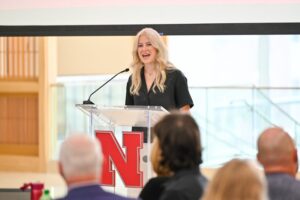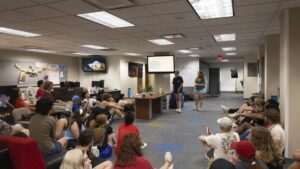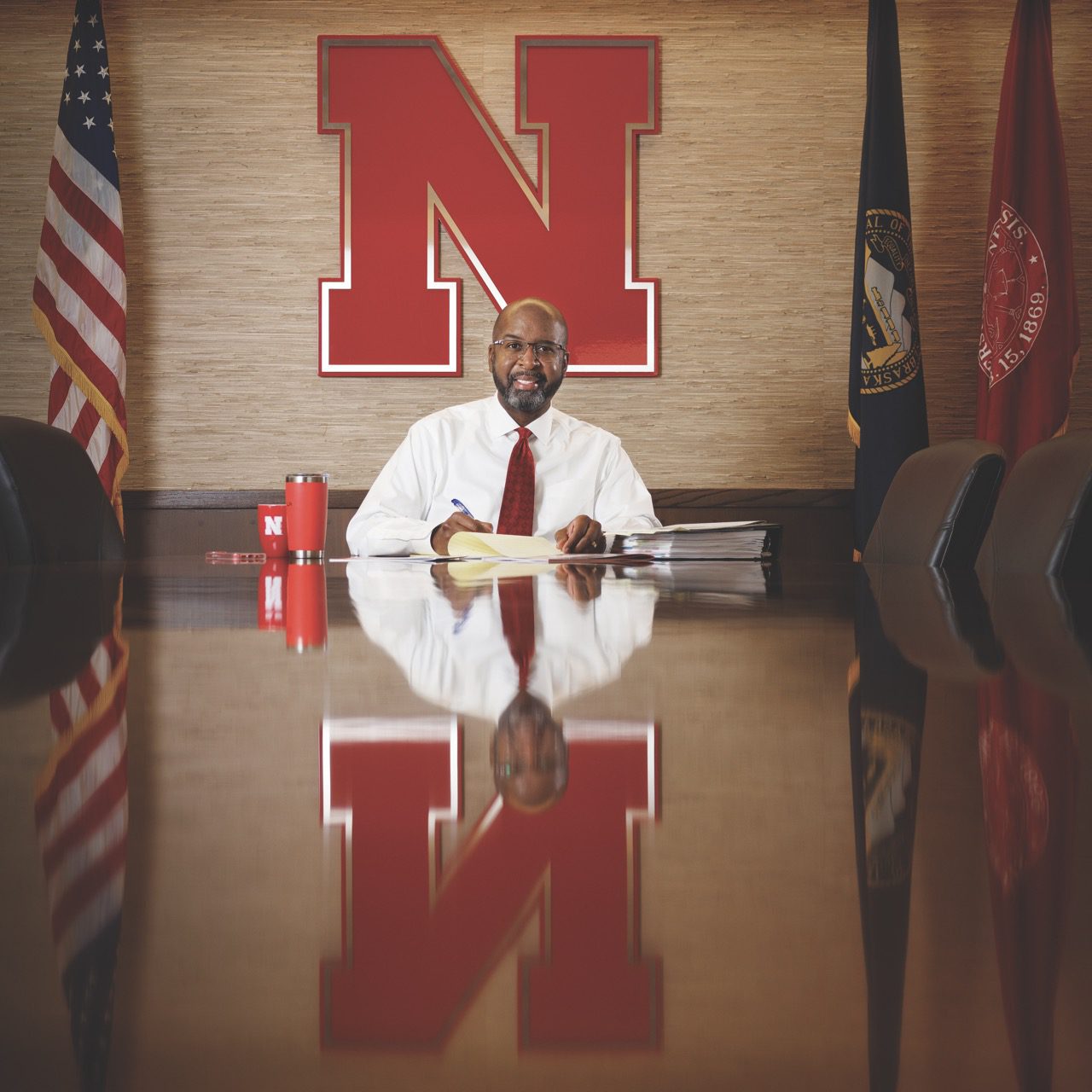Pride of Place Interviews Chancellor Bennett
Rodney D. Bennett, Ed.D., took office as the 21st chancellor of the University of Nebraska–Lincoln July 1. Pride of Place presented the following questions to the new chancellor to discover more about his vision for the university and his first impressions of the Cornhusker State:
What have you learned about the state of Nebraska since being confirmed as chancellor?
I had the wonderful opportunity to see more of the state as part of the Institute of Agriculture and Natural Resources Roads Scholars tour in early August. There is an incredible amount of diversity across the state — I was excited to meet different people and see the varied landscapes. I am a newly minted Husker, but I feel like I have a deeper understanding and appreciation for what is important to people. Nebraskans have a deep appreciation for their land-grant, flagship Big Ten institution. They embrace and celebrate the fact that we really are one of our nation’s most important institutions.
What do you see as some of the state’s greatest strengths and challenges?
Nebraska is unique. Many other places sort of ebb and flow with support of their public universities depending on how well athletic programs are doing, the school is performing or how private giving is going. Nebraskans are committed to this institution come what may — as the fight song says, “We’ll all stick together, in all kinds of weather.” There is a distinct sense of pride that Nebraskans have about UNL, that we have an opportunity to be the leader, and we should pursue every opportunity to grow our impacts. That is most definitely a strength.
With regards to challenges, we need to manage our budget, allocate resources appropriately, grow our research enterprise, recruit and retain students, expand outreach across Nebraska, and build stronger relationships with the Legislature and in communities. That is a list that sounds daunting, but I see it as manageable if we are committed to addressing the fundamentals.
What excites you most about serving as chancellor of UNL?
There is significant opportunity at UNL and Nebraskans have high expectations for the institution. I share those expectations and look forward to leading that charge, expanding the impacts of UNL both in the letter and spirit of what it means to be a flagship and land-grant institution.
What are the most important first steps for UNL to take under your leadership?
The first step is to continue to get to know this university and its people, and there is no shortage of people at UNL who are creative, passionate, and committed. Then it will be about working together to begin to bring into greater focus what the next 10-15 years could look like as we seek readmission to the Association of American Universities, grow enrollment, expand our research enterprise, resolve our budget issues and remain committed to advancing agriculture and natural resources across the state and beyond.
What do you believe distinguishes UNL from other public universities?
I have only been on campus a short time, and I already see that our university is a special place with a tremendously strong and enduring relationship with the people of our state. So we are a powerful opportunity creator for Nebraska. Our belief in the power of every person here, along with our ability to work together toward shared goals, sets us apart. When we say that every person and every interaction matters, we mean it.
What do you believe UNL should stand for in the minds of Nebraskans?
A commitment to excellence. The best place in the nation to be a student. Delivering a combination of value and quality that is hard to find anywhere else. And for all Nebraskans, we consider it a major point of pride that UNL delivers $11 in economic activity for every $1 that the State of Nebraska invests in us. We work every day to grow that return on investment even further. UNL also needs to be known for forward thinking, innovation and as a place that prioritizes the elevation of the state and its citizens.
Why do you believe higher education continues to be important, even as perspectives change around the traditional value proposition of going to college?
Higher education, and UNL in particular, is about creating opportunities — for students, Nebraskans, and the world. Our work is about transforming lives through education and research and preparing a skilled workforce for our state, and I do not think the importance of that work can be overstated.
What drives your passion for higher education?
What really speaks to me is to be at the forefront of helping young people identify their goals and the impact that they want to have with their life on their community and their state and the people around them. I am really interested in authentically meeting students and people where they are and then helping them on that journey.
What do you believe is the role of private philanthropy in public institutions of higher education?
Private donations continue to be an essential factor in enhancing learning opportunities for students and furthering the university’s mission. Private gifts not only enhance the university’s ability to create opportunities for students, but they also fuel economic growth, empower communities, and create a skilled workforce. Private philanthropy in public institutions of higher education is a powerful way to create a meaningful legacy and make a significant impact on the future.
How can private philanthropy help to move UNL forward?
Fortunately, in Nebraska the state has historically recognized the importance of an affordable, accessible, high-quality public university. But without the generous gifts of donors, we simply would not have the same capacity to compete for students, faculty and staff that allow us to make the necessary advancements to deliver on our teaching and research missions. Without a doubt, we will rely on private philanthropy to continue to be a leading flagship, land-grant university for our state and around the world.
"Private donations continue to be an essential factor in enhancing learning opportunities for students and furthering the university’s mission. Private gifts not only enhance the university’s ability to create opportunities for students, but they also fuel economic growth, empower communities, and create a skilled workforce."
Rodney D. Bennett, Ed.D.
You may also like ...

‘Your generosity changes lives:’ College of Business seniors reflect on impact of scholarship support
“I am able to have such a fulfilling college experience because of wonderful donors whose support doesn’t just fund tuition. It helps students pursue meaningful experiences, take on leadership roles and grow in ways that extend beyond the classroom,” Gianna Zitella, a senior actuarial science and finance major, said. “Your generosity changes lives, and I hope one day to pay it forward.”

The Daily Nebraskan provides voice for UNL campus, confidence for writers
“The experiences [donor support] has helped provide for myself and my co-workers have been unlike anything we would have received anywhere else. Thanks to your support, we have been able to cover things that I feel like we never would have dreamed of otherwise.”

Nebraska Law’s Client Counseling Team: 50 Years of Listening, Learning and Leading
“[The UNL Client Counseling team] taught me how to walk into a meeting with structure, but also how to pivot when a client takes the conversation somewhere unexpected. Those skills have been valuable to me as my career continues.”



